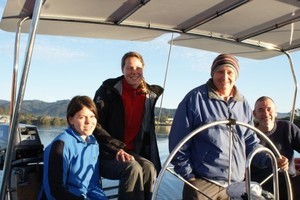How yachties from Oceans Watch are making a difference
by Nancy Knudsen on 24 Jul 2009

Some of the Oceans Watch team SW
Sailors on yachts in remote areas are making a difference.
Oceans Watch, that organisation of sailors on yachts, which was formed to assist local people in remote coastal areas to conserve and build their ocean resources, is doing just that - and this story is one example of just how successful they are.
The 2009 work season has successfully begun for two Oceanswatch teams – one based in Vanuatu (led by Natalie Riddler on several host yachts) and another in the Solomon Islands and Papua New Guinea (led by Chris Bone on Magic Roundabout).
Natalie's team is starting to collect data for the Vanuatu Ministry of Fisheries and Reef Check, on their first host boat, Waka Taitea, while Chris and the crew have spent a very productive week on Rennell Island in Solomons.
Rennell is at the very south of the Solomon Islands archipelago and is unusual among others in Melanesia, as it is populated by the people of Polynesian origin.
OceansWatch was approached by Willie Sau Kaitu’u, a member of the Tehakatu’u tribe in February 2009. Willie volunteers with World Vision in the Solomon’s so had access to the Internet and found their website. He also approached several other NGO’s but only OceansWatch responded.
When Chris and the team arrived at Rennell they found a tribe with great leadership that was acutely aware that its marine resources were reaching dangerously low levels. Since the 1960s various overseas fishing enterprises had persuaded the tribe to sell the last of their limited resources.
Crayfish were completely fished out 20 years ago and are only just starting to re-appear. Sea Cucumbers have almost completely vanished. The shark and clam populations at nearby Indispensable reefs have been decimated by overseas fishing boats.
Adding to the burden of overfishing have been regular cyclones, which cause repeated damage to corals. Surveys found mainly massive and encrusting corals, the life-forms less susceptible to wave damage. All other coral forms were found but very few foliose and branching corals.
In the damaged areas new growth was encountered but all colonies were estimated to be under 10 years old. The last major cyclone here was in 1993, a cyclone that destroyed every house in the area. As the bay where the Tehakatu’u tribe live is very open even distant cyclones adversely affect the reef.
The local community do not have the resources to fish offshore and the soils are very poor so reef fishing provides the major source of protein. The day after OceansWatch arrived the community called a meeting that they were invited to address.
One of OceansWatch's marine scientists, Alison Schmidt gave a talk on Coral Reef ecology and options were outlined for protecting fish stocks, such as constraints on fishing gear, seasonal bans, size limits and the creation of a Marine Protected Area (MPA).
Immediately after the talk the community formed the Tahakatu’u Conservation Committee, which asked us to locate a suitable MPA site.
Alternate 100m sections were surveyed throughout the tribe’s reef and it was soon apparent that one site stood out as it had more coral life forms and coral cover than other sites. Tribal elders were shown the site and felt it would also work well for them, as one boundary of the proposed site was traditionally a “tambu” area and another was marked by a cliff that looked a bit like a face, looking over the MPA. The area was mapped and “Reef Check” surveys were carried out in it as well as Rapid Assessment Surveys both within and outside the MPA.
The Conservation committee met again to discuss the findings and agreed on the MPA site. Whilst the community agrees that the MPA is an essential insurance policy for the tribe’s marine resources they are naturally concerned at the immediate loss of fishing area.
OceansWatch is committed to helping communities through this transition time and has drawn up a memorandum of understanding with the tribe to help them best utilise alternative sustainable resources for the next 4 years.
OceansWatch will train community members to monitor their own fisheries and MPA as well as support the community school and is considering other measures such as organic farming and Permaculture consultancy.
Rennell is known as the second largest upraised atoll in the world and the largest one in the Pacific. The freshwater lake Te'Nggano, formed from the ancient lagoon, is a World Heritage Site.
With the help of the international volunteers working there long-term, the Oceanswatch team had an opportunity to visit the lake and enjoy its natural beauty.
Magic Roundabout is now anchored in the vicinity of Peava, New Georgia. Here they will visit the local people who are already working towards protecting their marine resources for their communities.
So the work goes on - many coastal communities have had their fishing grounds affected by commercial fishing by ships from far-away countries.
If you would like to find out more about Oceans Watch, join, donate, be a volunteer sailor or contribute the use of your yacht for some of these activities, go to their www.oceanswatch.org!website in North America, or their www.oceanswatch.org.au!website in Australia.
If you want to link to this article then please use this URL: www.sail-world.com/59382